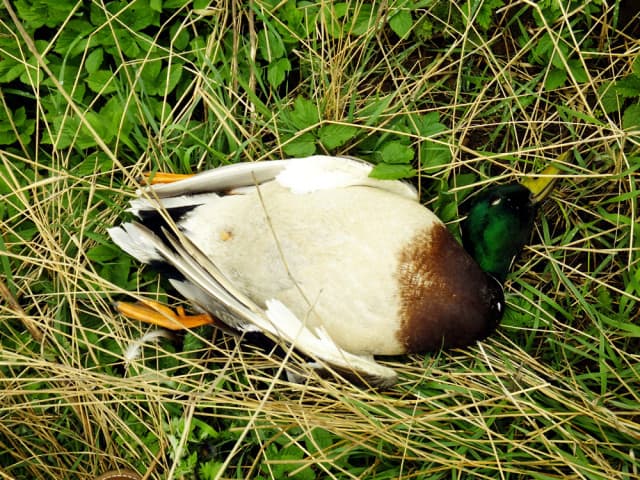LAURA HOWELLS
The Muse (Memorial University of Newfoundland)

After administrators at Memorial University posted a sign asking campus to stop feeding the ducks at Burton’s Pond, several apparently starved to death. Now one biology professor is taking matters into his own hands.
ST. JOHN’S (CUP) — Several dead ducks have been found at a Memorial University pond in St. John’s, N.L. in recent weeks. Last month two of those ducks were packaged and sent to university administration.
There are between 30 and 50 ducks that make their home in Burton’s Pond and have done so for approximately 15 years. Members of the public have fed the ducks for many years, especially during the winter months.
In November 2012, Facilities Management erected signs around the pond telling the public not to feed the ducks.
According to Dean Sorensen, MUN’s manager of communications, the measure was put in place to deal with the “very serious problem” of rats around the pond.
Ian Jones, a professor of biology at the university whose primary research involves the ecology and evolutionary biology of seabirds, said he was concerned about the new signs as soon as he saw them.
Jones said that many of the ducks that inhabit the pond are incapable of flight. When the pond freezes over, there are only limited sections of open water for them to inhabit, and subsequently there is not enough aquatic vegetation for the ducks to feed on. He worried that the new measures would lead to duck starvation.
Jones immediately took his concerns to university administration, but the signs remained.
Over the weekend of Jan. 19, Jones spotted a duck carcass at the pond. On Jan. 21, Jones spotted another. This time, he decided to examine it. Jones thinks the ducks starved to death: he found them frozen solid but just “skin and bone.”
Jones removed the carcasses from the pond for sanitation reasons. The following day he found another carcass, which he also removed from the area.
Jones elected not to discard any of the carcasses, as he believed them to be the responsibility of the university. Instead, he decided to package the deceased ducks and send them to Sorensen at communications.
Sorensen “received the frozen carcasses of two starved ducks,” Jones said. “And he’s complained about it to security.
“These are Memorial’s ducks and they should do something about them. I don’t have the freezer space to collect and preserve domestic ducks on behalf of the administration.”
Jones sent the ducks hoping for the administration to perform the necessary tests on the carcasses to determine whether starvation led to their death. He has not received word from Sorensen, but says he has since been “interrogated” by Campus Enforcement.
Because they are on MUN property, Jones believes the domestic ducks belong to the school and should be the university’s responsibility.
“The presence of dead ducks on campus is highly embarrassing,” Jones said. “I don’t think I’ve done anything wrong. I will continue to pick up dead ducks. But the next dead duck I find is going to be sent to the Society for the Prevention of Cruelty to Animals.
“Since the administration of MUN is not appearing to take action on this, perhaps the Society for the Protection of Cruelty to Animals will, which could include laying charges.”
Sorensen refused to comment on the carcasses.
“We have never been responsible for the care of those ducks,” Sorensen said. “No one takes care of those ducks; those ducks were not placed there by the university.”
On Jan. 31, biology and ocean sciences professor William Montevecchi will meet with Facilities Management to discuss the situation.
“When we have that meeting we’ll determine if there’s a problem, and if there is, what next steps we should take,” Sorensen said.
Since news has broken of the dying ducks, members of the public have dumped seeds around Burton’s Pond in an effort to avoid futher starvation, and MUN lifted the feeding ban.
—
Photo: J Mark Dodds/Flickr